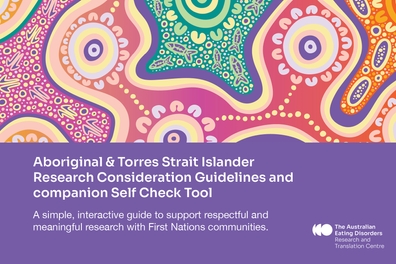
Watch the recording of the launch of the Aboriginal and Torres Strait Islander Researcher Self Check Tool and the announcement of a $2.8 million national First Nations-led research initiative.
25 June 2025
Recent developments in personalised treatment that take a flexible, holistic approach which considers a person’s biology, mental health and life circumstances, have the potential to revolutionise care for people with eating disorders and acknowledge the complex nature of these debilitating illnesses. However, no treatments of this kind have yet been tested or implemented successfully for eating disorders.
We spoke to PhD candidate and researcher, Emma Bryant about a recently published review by the InsideOut research team that looks at how personalised treatments could transform care for people with eating disorders and how the AEDRTC’s signature research trials are working to provide an evidence base for personalised care.
“Personalised medicine, also known as ‘individualised’ or ‘precision’ medicine is the hottest topic in mental health at the moment,” Bryant said.
“We wanted to synthesise what we currently know about personalised and individualised approaches to treating eating disorders, acknowledging that the science is still in its early stages.”
The diverse nature of eating disorders has long been acknowledged, yet treatment remains relatively standardised, so the current review aimed to identify areas in need of further research.
“Our aim was to bring together the emerging evidence, highlight key conceptual and methodological issues, and identify areas where further research is most urgently needed. Like any scientific review, the intention is really to help guide and focus what we do next.”
That next step will be conducting research through the AEDRTC signature trials to provide a much-needed evidence-base for personalised care.
“Many experienced clinicians have, in a sense, been ‘personalising’ treatments for a long time, recognising the limitations of standardised approaches. What has been missing is an evidence-based way to do this,” Bryant said.
“With recent technological and measurement advances, we have an opportunity to develop and empirically examine protocols and methods with which to personalise at a much deeper and more robust level. So that’s what we need to do next – conduct research trials on these different methods of personalisation.”
People with living experience of an eating disorder will play a central role in the signature research study.
“We will be engaging hundreds of people with living experience in a holistic understanding study, which aims to measure biological, psychological, cognitive and neurological markers over one year, to really get a better understanding of what is going on for someone with an eating disorder,” Bryant said.
“One of the main criticisms of current eating disorder care has been that we have these standardised treatments that really only work well for a small group of people, and many are designed to address a fairly narrow set of symptoms whilst being indifferent to the constellation of social, biological, cognitive and physiological factors that contribute to a person’s illness.”
“Personalised treatment will allow for the consideration of ALL of these factors that are unique to an individual and their story, and the hope is that not only will this make treatment more effective. It will also make it more acceptable, informed by diversity, and reduce drop-out. This may have systemic implications, for the way in which treatment is delivered. It may be that treatment is best delivered at home in the person’s own environment than in a standardised hospital program, for example. But we need research to understand all of this before we can really say how this will change the treatment environment for certain. It’s very much an evolving space.”
Find out more about our signature research studies here
Watch the recording of the launch of the Aboriginal and Torres Strait Islander Researcher Self Check Tool and the announcement of a $2.8 million national First Nations-led research initiative.
Aboriginal and Torres Strait Islander leaders, researchers, clinicians, and community members gathered on Gadigal Country last week to celebrate the launch of the AEDRTC Aboriginal and Torres Strait Islander Researcher Self Check Tool and a $2.8 million investment from the Australian Government to support the first national research into eating disorders in First Nations communities.
The importance of co production, collaboration and inclusion was central to the discussions, presentations and connections that made for a lively and inspired two days at Think Tank 2025 where eating disorders specialists came together to advance science and understanding.
Watch the recording of the launch of the Aboriginal and Torres Strait Islander Researcher Self Check Tool and the announcement of a $2.8 million national First Nations-led research initiative.
Aboriginal and Torres Strait Islander leaders, researchers, clinicians, and community members gathered on Gadigal Country last week to celebrate the launch of the AEDRTC Aboriginal and Torres Strait Islander Researcher Self Check Tool and a $2.8 million investment from the Australian Government to support the first national research into eating disorders in First Nations communities.


